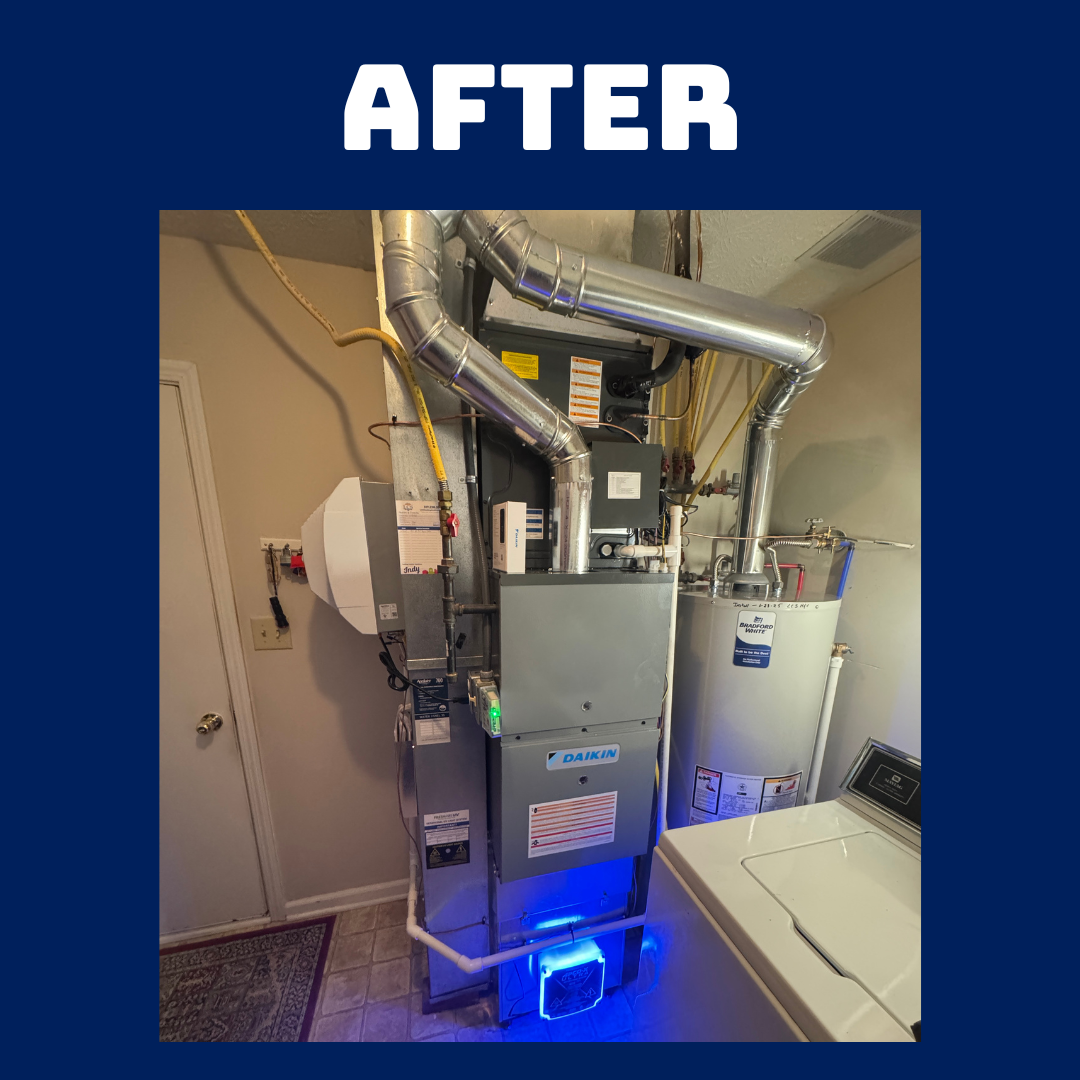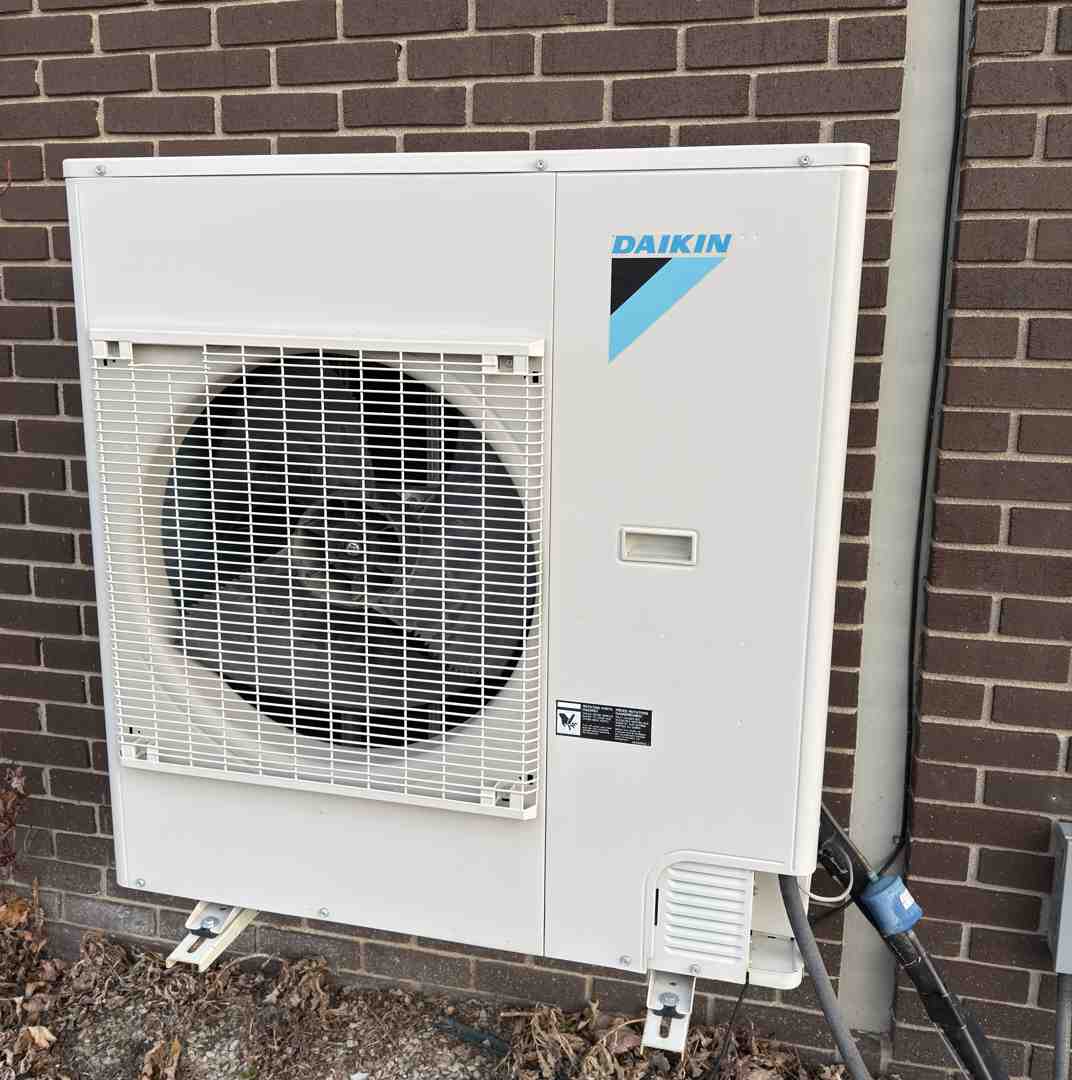Don't Sweat It: Your Guide to Solving HVAC System Problems
Why Understanding HVAC System Problems Matters for Indianapolis Homeowners
HVAC system problems can turn your comfortable home into an uncomfortable nightmare, especially during Indiana's sweltering summers and frigid winters. When your system fails, you need answers fast.
The 10 Most Common HVAC System Problems:
- Dirty or clogged air filters - Causes poor airflow and system overheating
- Thermostat malfunctions - Wrong settings, dead batteries, or faulty sensors
- Poor airflow and inconsistent temperatures - Blocked vents or leaky ducts
- Water leaks and drainage issues - Clogged condensate drains causing damage
- Refrigerant leaks - System blows warm air and loses efficiency
- Unusual noises - Squealing, banging, or grinding sounds
- Frequent or short cycling - System turns on and off too often
- Frozen evaporator coils - Restricts cooling and can damage compressor
- Electrical problems - Tripped breakers and blown fuses
- Furnace ignition issues - No heat when you need it most
You probably don't think about your HVAC system when it's working properly. But when you wake up to an uncomfortable home or hear disturbing noises from your unit, it becomes your top priority.
Most HVAC problems fall into two categories: simple fixes you can handle yourself, and complex issues that need professional attention. Knowing the difference can save you time, money, and frustration.
The good news? Many common problems have straightforward solutions. Dirty filters, incorrect thermostat settings, and blocked vents account for a huge percentage of service calls - and homeowners can often fix these themselves.
However, some issues require professional help for safety reasons. Electrical problems, refrigerant leaks, and gas-related repairs should always be handled by trained technicians.
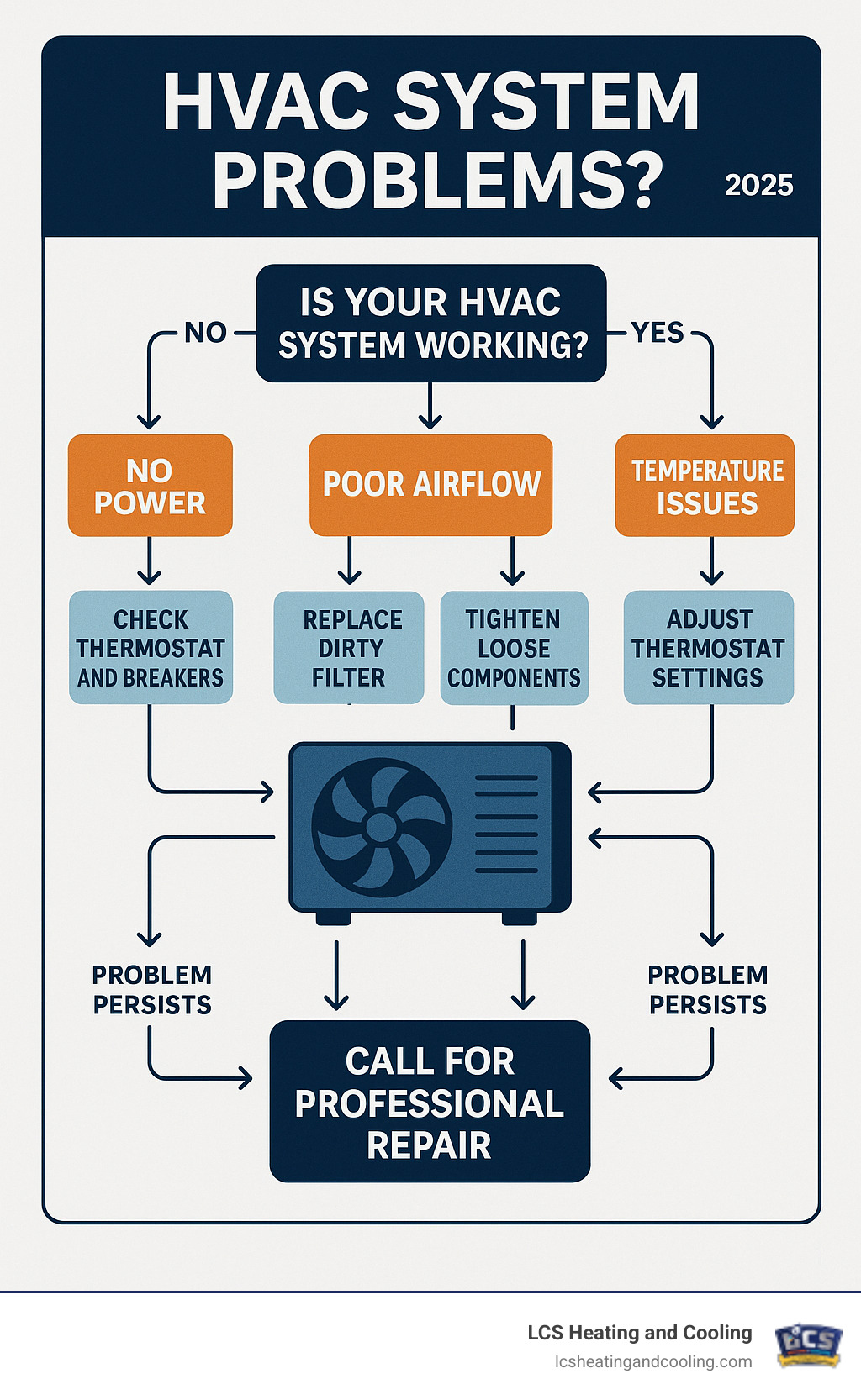
Top 10 Common HVAC System Problems and How to Fix Them
When your heating and cooling system starts acting up, it can feel overwhelming. But here's the good news: most HVAC system problems follow predictable patterns, and many have simple solutions you can try yourself. Let's walk through the ten most common issues we see in Indianapolis homes and what you can do about them.
1. Dirty or Clogged Air Filters
If we had to pick the champion of HVAC system problems, dirty air filters would win hands down. It's amazing how something so simple can cause so much trouble. Think of your air filter as your system's lungs - when they're clogged, everything suffers.
You'll notice the signs pretty quickly. Reduced airflow from your vents is usually the first clue, followed by higher energy bills as your system works overtime to push air through that dirty barrier. Your home might never quite reach the temperature you want, and you'll probably see more dust floating around.
The worst part? A severely clogged filter can cause your air conditioning to freeze up or make your furnace overheat. We've seen cracked heat exchangers and damaged compressors that could have been prevented with a simple filter change.
DIY Solution: Replace that filter! Check it monthly during peak seasons and swap it out when it looks gray or you can't see light through it. Most standard 1-inch filters need changing every 1-3 months, while thicker 4-inch filters can last 3-6 months.
When to call a pro: If you've replaced the filter but problems persist, there might be damage from prolonged neglect that needs professional attention.
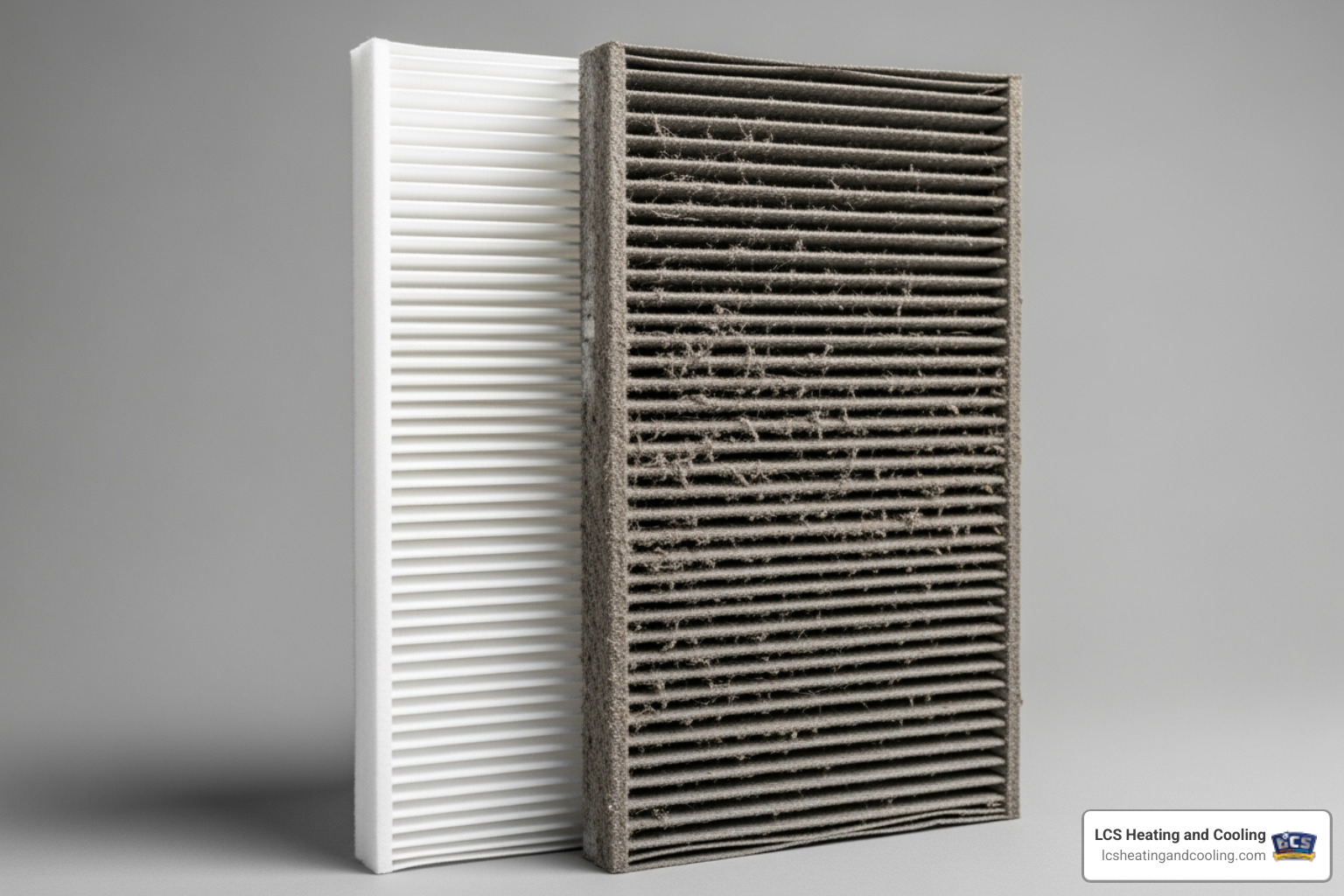
2. Thermostat Malfunctions
Your thermostat is like the brain of your HVAC system. When it gets confused, everything else follows suit. These little devices cause more headaches than you might expect, but they're often easy to fix.
The telltale signs include incorrect temperature readings (your house feels like a sauna but the thermostat insists it's perfectly cool), systems that won't turn on at all, or units that cycle on and off like they can't make up their minds.
Before you panic, check the obvious stuff first. Dead batteries are surprisingly common culprits - if your display is dim or blank, pop in fresh ones. Make sure your settings are correct too. We can't count how many service calls we've made only to find the thermostat was set to "heat" in July or the fan was stuck on "on" instead of "auto."
DIY Solution: Check your settings and replace batteries first. Give the thermostat a gentle cleaning to remove dust from the sensors. Also, make sure it's not getting direct sunlight or sitting near heat sources that might throw off its readings.
When to call a pro: If basic troubleshooting doesn't work, you might have faulty wiring or a broken sensor that needs professional diagnosis.
3. Poor Airflow and Inconsistent Temperatures
Nothing's more frustrating than walking from your perfectly comfortable living room into a bedroom that feels like the Arctic Circle. Poor airflow and inconsistent temperatures are among the most annoying HVAC system problems homeowners face.
The usual suspects include blocked vents (we've found everything from furniture to forgotten toys covering them), leaky ductwork that lets your expensive conditioned air escape into attics and crawl spaces, and systems that are simply the wrong size for your home.
Leaky ducts are particularly sneaky. You might be losing up to 30% of your conditioned air before it even reaches your living spaces, which explains those sky-high energy bills.
DIY Solution: Start by unblocking all vents - both supply and return vents need to breathe freely. Check any dampers in your system to make sure they're positioned correctly. For visible duct leaks you can reach safely, try sealing small gaps with mastic sealant or specialized aluminum foil tape (regular duct tape actually isn't great for ducts!).
When to call a pro: Extensive ductwork problems, system sizing issues, or suspected design flaws need professional evaluation and repair.
4. Water Leaks and Drainage Issues
Finding a puddle around your indoor unit can be alarming, but water leaks are actually pretty common HVAC system problems. While your air conditioner naturally produces water as it cools your home, that water should drain away neatly - not pool on your floor.
The most common culprit is a clogged condensate drain line. As your system removes moisture from the air, that water needs somewhere to go. When algae, mold, or debris blocks the drain line, water backs up and overflows. You might also notice musty odors, high humidity, or even see your system shut down completely (many units have safety switches to prevent water damage).
DIY Solution: Clear the drain line by first turning off power to your unit. Find the condensate drain line (usually a PVC pipe) and look for visible clogs. You can pour a cup of distilled vinegar down the access port to kill algae, or use a wet/dry vacuum to suction debris from the exterior end of the drain line.
When to call a pro: If leaks persist after clearing the drain, if you suspect a broken condensate pump, or if the issue stems from frozen coils (which might indicate other problems).
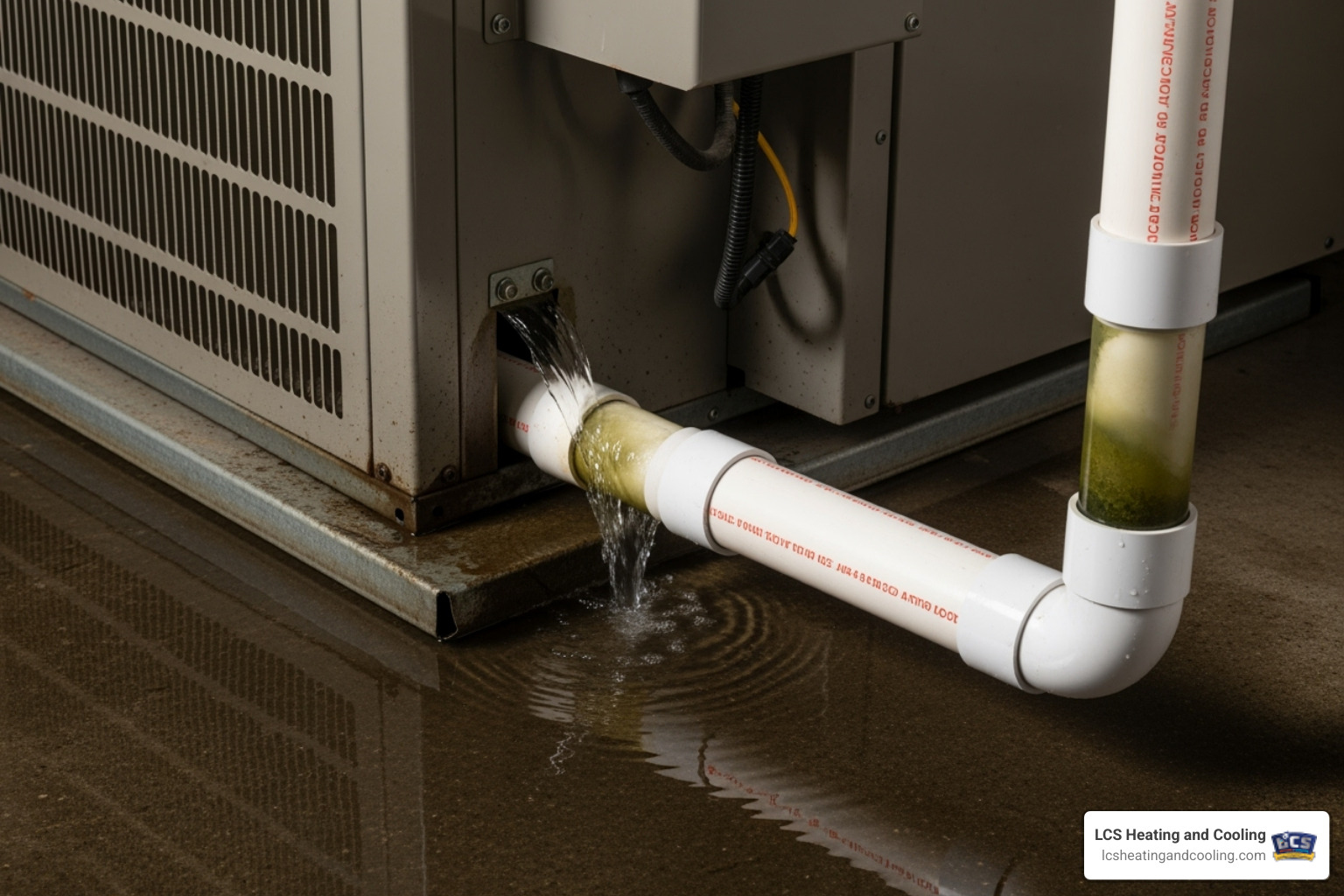
5. Refrigerant Leaks: A Critical HVAC System Problem
Refrigerant is your air conditioner's lifeblood. Unlike gasoline in your car, refrigerant doesn't get "used up" - it circulates in a closed loop. So if your system is low on refrigerant, you've got a leak, and that's a serious issue.
You'll know something's wrong when your AC starts blowing warm air or just doesn't cool like it used to. You might hear hissing sounds from the unit or notice ice buildup on the indoor coils or copper lines. Your energy bills will climb as the system works harder and harder to cool your home.
Refrigerant leaks often develop from normal wear and tear, corrosion (especially in older copper lines), or damage from vibrations and impacts.
When to call a pro: Always - and we mean always - call a professional for refrigerant issues. This isn't a DIY job. Refrigerant requires special handling and equipment, and environmental regulations govern its use. Simply adding more refrigerant without fixing the leak is like putting a band-aid on a broken pipe - expensive, ineffective, and harmful to the environment.
6. Unusual Noises (Squealing, Banging, Grinding)
Is your HVAC system trying out for a horror movie soundtrack? Unusual noises are your system's way of crying for help, and different sounds point to different problems.
Squealing usually means a worn belt in the blower or fan motor. Banging or clanking often indicates loose parts or a bent fan blade hitting something it shouldn't. Grinding sounds point to motor bearings that are wearing out and desperately need attention.
Hissing might mean refrigerant is escaping, while whistling or screaming can indicate dangerous pressure issues. Even popping sounds from your ductwork, while often harmless (just metal expanding and contracting), can sometimes mean debris is rattling around.
DIY Solution: If you hear banging, check whether any access panels have come loose and tighten them carefully. For obvious obstructions around fan blades, turn off the system and clear the debris.
When to call a pro: Most mechanical noises need professional attention, especially grinding, persistent squealing, or any whistling or screaming sounds. These often signal serious problems that could lead to expensive breakdowns if ignored.
7. Frequent or Short Cycling
When your HVAC system turns on and off repeatedly without completing proper heating or cooling cycles, we call it "short cycling." It's like your system keeps starting a race but never crosses the finish line, wasting energy and wearing out components.
You'll notice the unit runs for just a few minutes then shuts off, only to start up again shortly after. Your home never reaches the desired temperature, your energy bills climb, and your system ages faster than it should.
Short cycling can happen when your system is oversized for your home (it cools or heats too quickly), when clogged filters cause overheating, or when your thermostat is in a bad location getting false readings. Refrigerant leaks and dirty coils can also cause the problem.
DIY Solution: Check your filter first - a dirty filter is often the culprit. Make sure your thermostat isn't exposed to drafts, direct sunlight, or heat sources. Clear debris from around your outdoor unit.
When to call a pro: If short cycling continues after basic troubleshooting, you might have sizing issues, refrigerant problems, or electrical faults that need professional diagnosis.
8. Frozen Evaporator Coils
It might seem weird for your air conditioner to freeze up during an Indianapolis summer, but frozen coils are actually common HVAC system problems. When the evaporator coil (the cold part inside your home) gets too cold, moisture in the air freezes on it instead of just condensing.
You'll see ice buildup on the copper lines or the indoor coil itself, notice your AC blowing warm air, and probably find water leaks around the indoor unit as the ice melts.
The most frequent cause is restricted airflow from dirty filters, blocked vents, or dirty coils preventing enough warm air from flowing over the cold coil. Low refrigerant from leaks can also make the coil too cold, and a malfunctioning blower fan won't move enough air to prevent freezing.
DIY Solution: Turn off your AC and let the unit thaw completely (this takes several hours). While it's thawing, replace your air filter and check that all vents are open and unobstructed. Place towels around the unit to catch melting water.
When to call a pro: If the coil refreezes after thawing, or if you suspect refrigerant leaks or fan problems. Frozen coils can damage your compressor if not properly addressed. You can find more information about Common air conditioner problems.
9. Electrical HVAC System Problems & Tripped Breakers
Electrical issues rank among the most dangerous HVAC system problems and always require careful handling. Your HVAC system draws significant power, and electrical faults can create fire hazards or cause expensive component damage.
The warning signs include tripped circuit breakers, repeatedly tripped breakers for your HVAC system, flickering lights when the system starts, or burning smells from the unit or electrical panel. Any visible signs of burnt wires or components demand immediate attention.
Often, electrical problems start with an overworked system (usually from clogged filters forcing the system to work too hard), worn components like capacitors or contactors, loose wiring, or failing motors drawing too much current.
DIY Solution: Reset a tripped breaker once by flipping it completely off, then back on. If it immediately trips again, stop there. Check your air filter since a clogged filter can overwork the system and trip breakers.
When to call a pro: Immediately if breakers trip repeatedly, if you see electrical damage, or smell burning. These are serious safety issues that require professional expertise and specialized tools.
10. Furnace Ignition or Pilot Light Problems
When your furnace won't produce heat on a cold Indiana night, it's definitely one of the more urgent HVAC system problems. Modern gas furnaces have sophisticated safety systems, but ignition problems still occur.
The symptoms are pretty clear: no heat from your vents when the furnace should be running, the furnace tries to start but fails to light the burners, or for older systems, the pilot light is out. You might notice a faint gas smell, though a strong gas odor requires evacuating your home and calling emergency services.
Common causes include pilot lights that have been extinguished by drafts in older furnaces, faulty electronic ignition systems in newer models, dirty flame sensors that can't detect the flame properly, or gas supply issues like closed valves or line problems.
When to call a pro: Always call a professional for any gas-related or ignition system issues. The risks of gas leaks, carbon monoxide poisoning, or improper repairs are too serious for DIY attempts. Our trained technicians have the tools and expertise to safely diagnose and repair these critical systems.
Understanding these common HVAC system problems helps you know when you can tackle an issue yourself and when it's time to call in the professionals. When in doubt, it's always better to err on the side of safety and get expert help.
The Power of Prevention: How to Avoid Future HVAC Headaches
Here's the thing about HVAC system problems – most of them are completely preventable. It's like brushing your teeth to avoid cavities, or changing your car's oil to prevent engine trouble. A little care today saves you a lot of headaches (and money) tomorrow.
Regular maintenance is your secret weapon against unexpected breakdowns. When we perform routine tune-ups, we catch small issues before they turn into major disasters. That loose electrical connection? We'll tighten it before it causes your system to fail on the hottest day of summer.
The benefits go way beyond just avoiding repairs. System longevity is probably the biggest win – proper maintenance can add years to your HVAC system's life. We've seen well-maintained units running strong after 15-20 years, while neglected systems fail after just 8-10 years.
Energy efficiency is another huge advantage. A clean, well-tuned system doesn't have to work as hard to keep you comfortable. Dirty filters force your system to strain, dirty coils make heat transfer less efficient, and small refrigerant leaks make your AC run constantly. All of this shows up on your utility bills.
The cost savings are real too. Think about it – spending a little on preventative care versus thousands on emergency repairs or early replacement. We've seen homeowners avoid major compressor failures simply because we caught low refrigerant during a routine check.
Your daily comfort improves as well. No more hot and cold spots, no more mysterious noises at 2 AM, and better air quality for your family.
Filter changes are your most important homework assignment. We know we've mentioned this throughout the article, but it really is that critical. Mark your calendar, set phone reminders, whatever it takes. This one simple task prevents so many problems.
Coil cleaning should happen annually. Those outdoor condenser coils get caked with dirt, pollen, and debris (especially here in Indianapolis with our seasons). Dirty coils can reduce your system's efficiency by 30% or more.
Drain line clearing is often overlooked until you have water pooling around your unit. A simple vinegar flush a couple times a year keeps everything flowing smoothly.
Most importantly, professional tune-ups give you peace of mind. We recommend scheduling your air conditioning service in spring and your furnace service in fall. During these visits, our technicians inspect electrical connections, lubricate moving parts, check refrigerant levels, clean components, calibrate your thermostat, and inspect your ductwork for leaks.
For gas furnaces, we also check the ignition system and all gas connections for safety. These aren't things you can or should handle yourself, but they're critical for your family's safety and comfort.
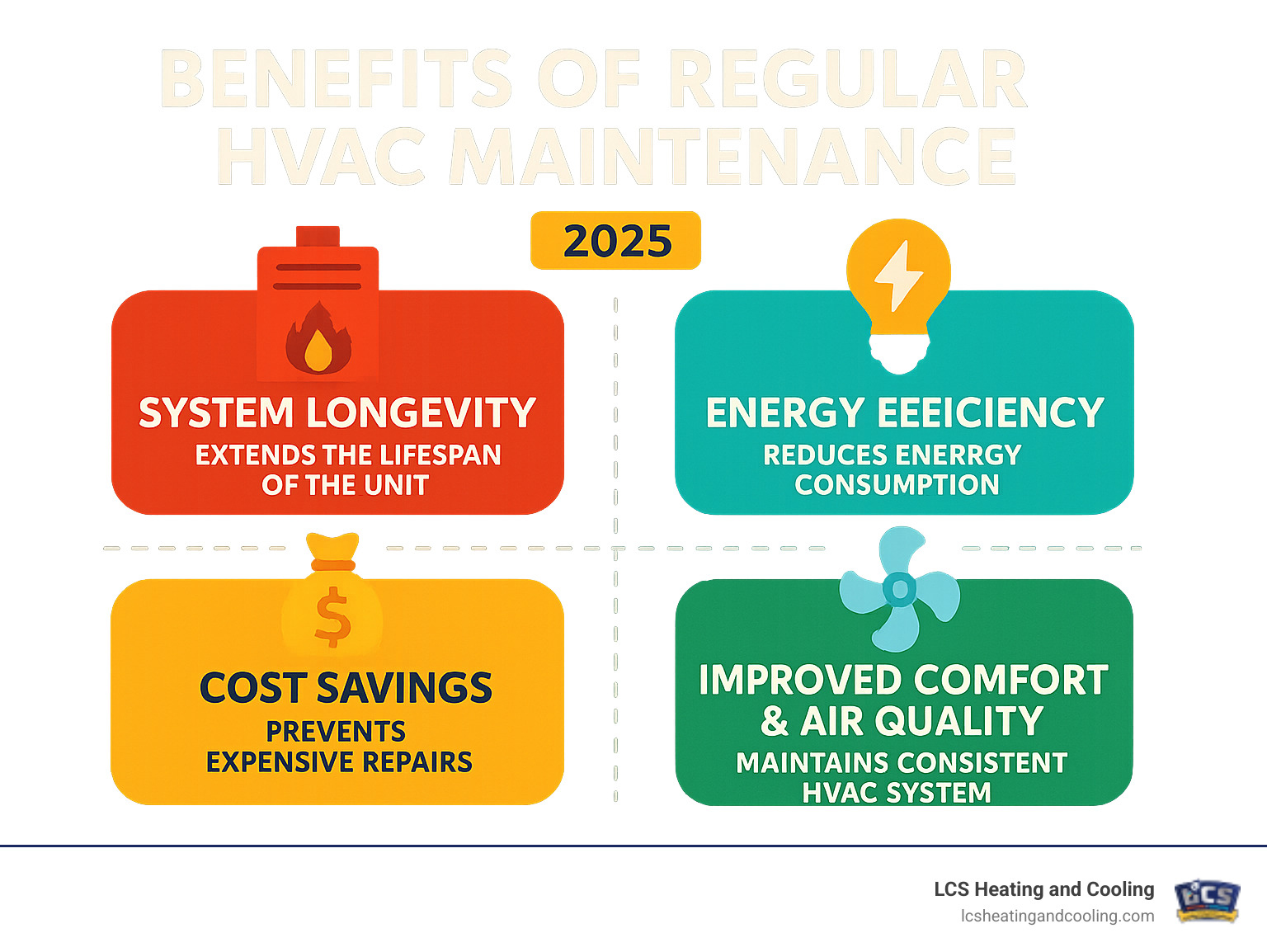
The bottom line? Prevention is always cheaper than repair. And it's definitely more comfortable than dealing with a broken system when you need it most.
Frequently Asked Questions about HVAC Issues
After helping thousands of Indianapolis homeowners over the years, we've noticed certain questions come up again and again. Let's tackle the most common concerns about HVAC system problems that keep our customers up at night (sometimes literally!).
Why are my energy bills so high?
Ah, the dreaded electric bill that makes you do a double-take. If your energy costs have been creeping up, your HVAC system is often the culprit – but the good news is that most causes are fixable.
Dirty filters top our list of energy bill villains. When your filter is clogged with dust, pet hair, and mystery particles, your system has to work like a marathon runner breathing through a straw. It's exhausting and expensive.
Dirty coils are another sneaky energy thief. When your evaporator or condenser coils are coated in grime, they can't transfer heat properly. It's like trying to cool down by wrapping yourself in a dirty blanket – not very effective.
Leaky ducts might be silently bleeding money from your wallet. If conditioned air is escaping into your attic or crawl space instead of reaching your living room, you're essentially air conditioning spaces you don't even use.
Your aging system might simply be showing its years. HVAC units over 10-15 years old are like that old car that gets terrible gas mileage – they still run, but they're not doing you any favors on efficiency.
Lack of maintenance allows small problems to snowball into energy-hungry monsters. Skipping tune-ups is like never changing your car's oil – eventually, everything works harder than it should.
Sometimes the issue isn't your HVAC at all. Poor insulation means your system is fighting a losing battle against heat transfer, working overtime to keep you comfortable while your home bleeds energy through walls, windows, and gaps.
How often should I have my HVAC system serviced?
Here's our golden rule: annual tune-ups are your HVAC system's best friend. We recommend scheduling your air conditioning service in spring (before those scorching Indianapolis summers hit) and your furnace service in fall (before winter decides to show up unannounced).
Think of it like an annual physical for your HVAC system. Just like you wouldn't skip your doctor's appointment, your heating and cooling equipment needs that professional attention to catch HVAC system problems before they turn into expensive emergencies.
Manufacturer recommendations almost universally support this annual schedule, and many warranties actually require it. Missing regular service can void your warranty – and trust us, you don't want to find that when you need a major repair.
The benefits of professional service go far beyond just preventing breakdowns. Our technicians clean components you can't reach, spot problems you can't see, and fine-tune your system for peak efficiency. It's like having a personal trainer for your HVAC – everything just works better.
Can I repair my HVAC system myself?
We love a good DIY spirit, but when it comes to HVAC system problems, there's definitely a line between "weekend warrior" and "call the professionals."
Filter changes are absolutely in your wheelhouse – in fact, we insist you handle these yourself. It's the single most important thing you can do for your system's health.
Cleaning vents and ensuring they're not blocked by furniture or that mysterious sock that disappeared from the laundry? That's all you. Clearing drains with a simple vinegar flush or vacuum suction is another great DIY win.
Basic thermostat maintenance like replacing batteries or double-checking settings falls into the "homeowner friendly" category too.
But here's where we draw the line: electrical hazards are no joke. Your HVAC system pulls serious power, and one wrong move can be dangerous or deadly. Refrigerant handling requires specialized equipment and training – plus, it's actually illegal for non-certified technicians to work with refrigerant.
Gas-related issues should send you straight to the phone to call us. Gas leaks, pilot light problems, or ignition issues can create serious safety risks including carbon monoxide poisoning.
When you hear strange mechanical noises, smell burning, or face persistent problems after trying DIY solutions, it's time to step back and let the professionals handle it. We've seen too many small problems turn into expensive disasters when well-meaning homeowners tried to fix complex issues themselves.
There's no shame in calling for help – that's what we're here for!
Get Your Comfort Back with Professional HVAC Service
We know that tackling simple maintenance tasks like changing filters and checking thermostat settings can feel empowering. But let's be honest – there's a clear line between what you can safely handle and what requires professional expertise.
When your troubleshooting efforts hit a wall, it's time to call in the professionals. Complex repairs involving electrical components, gas connections, or refrigerant systems aren't just challenging – they're potentially dangerous. Safety concerns should always take priority over saving a few dollars.
Think about it this way: you wouldn't perform surgery on yourself, right? The same logic applies to your HVAC system when it comes to serious HVAC system problems.
At LCS Heating and Cooling, we've seen it all in the Indianapolis area. From mysterious midnight breakdowns to systems that seem to have a mind of their own, we understand that a comfortable home is absolutely essential to your family's happiness and well-being.
That's exactly why we developed our "7-Star Concierge Service." We believe you shouldn't have to stress about getting your comfort back. Our approach emphasizes promptness because we know you can't wait days for relief, clear communication so you understand exactly what's happening with your system, and streamlined processes that respect your time and schedule.
We make sure you're informed every step of the way and treated with the respect you deserve. After all, you're inviting us into your home – the least we can do is provide lasting comfort solutions that actually work.
Don't let HVAC system problems turn your comfortable sanctuary into an uncomfortable ordeal. Whether your air conditioner is blowing warm air during an Indiana heat wave or your furnace has decided to take a vacation during a cold snap, we're here to help.
Our experienced technicians serve homeowners throughout Indianapolis, Carmel, Fishers, Lawrence, Noblesville, and Zionsville. We're ready to diagnose those tricky problems and get your system running smoothly again.
Ready to get your comfort back? Schedule your air conditioner repair in Indianapolis or contact us for any of your heating and cooling needs. We'll have you feeling comfortable in your own home again before you know it.
